What conditions can enable an inclusive policy making? The Green Economy Coalition worked with civil society organisations to facilitate ways for local people to coherently shape green economy policy. The EU funded project ‘Green Economy Dialogues’ documented the stories of seven civil society-led national and regional dialogue processes in Asia, Africa, Latin America and the Caribbean, and offers evidence of how social inclusion can drive more transformative policymaking.
The shift to a green economy is an ambitious and urgent global objective. Success at scale in this endeavour requires another lens with which to see inclusion. Tackling inequalities is not just an option, but a core aspect of the transition. Participatory dialogues have facilitated and enabled important changes in policymaking. Governments, institutions and the private sector widely acknowledge the need for social inclusion in green policy. However, civil society has too often been left out of relevant policy processes. An inclusive green economy approach sets out to ensure that people – particularly the poorest, women, marginalised communities and small and informal enterprises – benefit from green policymaking.
Transformative green economy policy agendas – that the project analysed – are often incubated at local and state level rather than always starting in central government. Inclusion benefits from a robust and well-resourced institutional mechanism and from being embedded in governance systems. Dialogue platforms, action learning groups and consultation forums are needed to provide for greater stakeholder empowerment in policy processes. To drive such dialogues, facilitators, need to be both well rooted within civil society and confident to convene higher level decision makers.
Stakeholders are most likely to engage in green economy dialogues when they focus on key local sectors, such as agriculture or fisheries, and support more devolved decision-making. From the private sector, local green enterprises, are most likely to actively engage in dialogue processes, and are often quick to take ownership and pioneer new efforts.
New policies and investments often have multiple functions to restore the environment and to tackle social issues like poverty, inequality and unemployment. The GEC dialogues project highlighted that people are at the heart of successful approaches. The initiative was implemented from 2016-2020.
